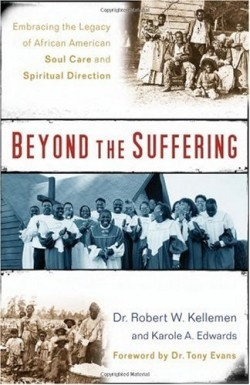Beyond the Suffering
Embracing the Legacy of African-American Soul Care and Spiritual Direction
One by one, each slipped away, escaping the overseer, to meet in the thickest part of the woods. Behind an arbor of branches, they listened to an uplifting and soul-supporting service. Or they gathered in a tumbled-down cabin around a large pot which, when shouted into, could deaden the sounds of worship, because to be caught listening to any message besides “obey your masters” could lead to a whipping.
These weren’t early Christians hiding from the Romans, but enslaved African-Americans hiding their Christian worship from their Christian oppressors. This was the environment that birthed the Black churches and began, according to historian W.E.B. DuBois, the “first Afro-American institution.”
Voices from the past testify not only of the immense suffering the slaves endured, but the role that faith played in providing comfort and hope. An unnamed former slave born in 1845 said, “The darkest hours of my life as a slave came just before freedom, and in the same way, in my trials with sin, when everything seemed lost I was delivered. No sooner had I surrendered and cried out, ‘Lord, have mercy!’ than the work was done. It seemed as if a great burden were lifted from me, and my soul took a leap and left the old body.”
Authors Kellemen and Edwards use their background as counselors and church leaders to combine history and self-care in a guide to healing and strengthening belief in God. Kellemen has authored several books including Spiritual Friends: A Methodology of Soul Care and Spiritual Direction and Soul Physicians: A Theology of Soul Care and Spiritual Direction and has acted as a Pastor at various churches. Edwards ran a women’s small-group ministry and facilitated its spiritual leadership and management.
Beyond the Suffering is a close examination of the early founders of the African-American churches and analyzes their methods of reaching and supporting both the enslaved and free black population. Early preachers provided a road map for anyone who ministers to the needy: Sustain and say “It’s Normal to Hurt”; heal and say “It’s Possible to Hope”; reconcile and say “It’s Horrible to Sin, but Wonderful to Be Forgiven”; and guide “As much by our actions (our model) as by our interaction (our message).” The book is written with the hope that techniques of the past can be revived and used to heal the fractures in the present, to return to the interdependence that helped pull the enslaved through day-to-day life.
Filled with discussion questions, Beyond the Suffering provides a guide for each person to become a shepherd and help minister to their community with the strength and purpose that guided the heroic founders of the early Black churches.
Reviewed by
Deirdre Sinnott
Disclosure: This article is not an endorsement, but a review. The publisher of this book provided free copies of the book to have their book reviewed by a professional reviewer. No fee was paid by the publisher for this review. Foreword Reviews only recommends books that we love. Foreword Magazine, Inc. is disclosing this in accordance with the Federal Trade Commission’s 16 CFR, Part 255.

